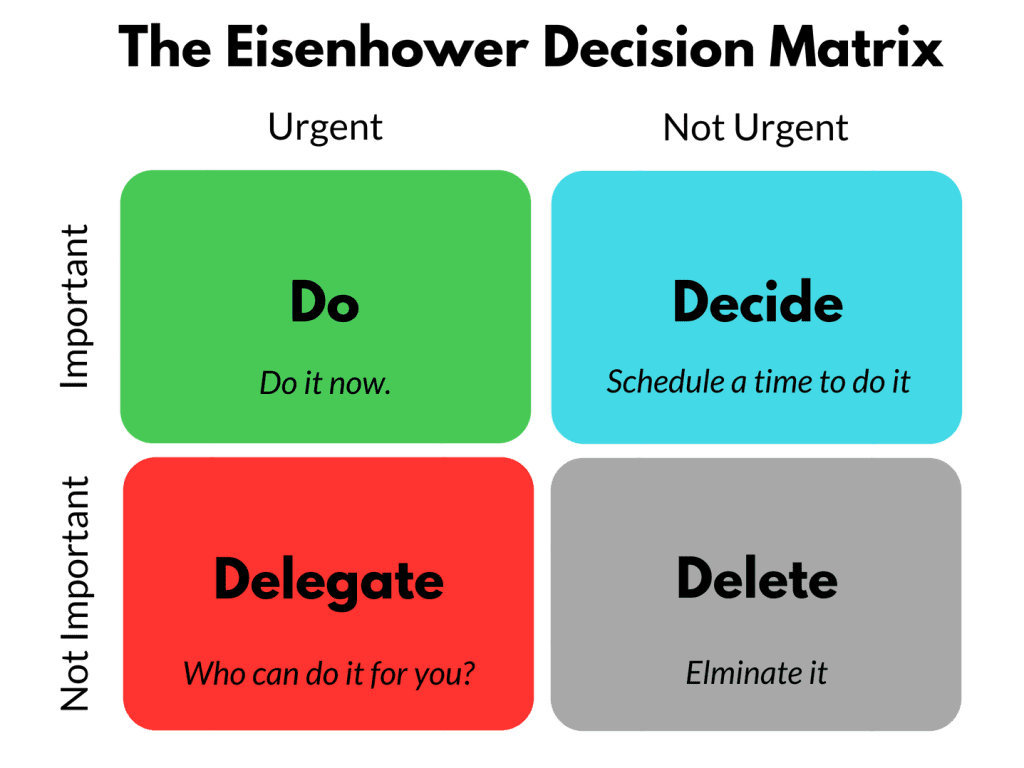When you’re an entrepreneur, your to do list is often long and constantly growing longer. There are an overwhelming number of things you need to do, and it can feel like they’re all urgent. In such cases, it’s easy to push important tasks to the side and focus on less-vital activities, but that often
means you miss deadlines, make mistakes or always feel as though you’re trying to catch up.
As you look at all that needs to be done, ask yourself some important questions:
- What tasks are crucial to your success?
- What tasks can be completed this week?
- How do you prioritize those tasks?
- How do you make sure they get done on time?
By answering these questions and creating a system for keeping track of everything you need to do, it’ll be much easier for you to see what really needs to get done. You should try and set a specific time each week to go through this process. For example, create a “Brain Dump” list on Sunday for the upcoming week.
1. What tasks are crucial to your success?
Before you start your business, you need to know which tasks are crucial to your success. This will help ensure that you don’t end up wasting time on unimportant tasks and gives you an idea of how long it will take for each task.
You also want to make sure that anything that can be delegated or outsourced, is done so as soon as possible so all of your focus can go into completing the most important things in your business plan.
2. List all the things you need to do this week.
Don’t worry about prioritizing the items yet, just get everything down on paper. This can be a daunting task and feel like a lot of work, but it doesn’t have to be! Just take small steps at a time and don’t forget about the small things like making phone calls or sending emails.
3. Prioritize them by importance.
Now that you’ve listed everything on your plate, it’s time to prioritize.
This is not always easy for people to do–and for good reason! Prioritizing can feel like a huge commitment and make you feel overwhelmed by the sheer number of things on your list. But prioritizing by importance is actually one of the best ways to avoid procrastination and ensure that you get done first what matters most.
If there are two tasks that require equal amounts of time but one has higher stakes than another, then prioritize based on those stakes instead of their actual workloads (which may be similar).
4. Choose a time frame for each item.
Setting a due date will help you stay on track and keep yourself accountable. You can be somewhat flexible with your due dates, but if a task doesn’t have a deadline, it often will go to the bottom of your list and not get done.
The first thing to do is look at the task list from last week and see what wasn’t completed. If there are any tasks that can be done in less than 15 minutes, then go ahead and do those first! Start with the smallest tasks first because they will likely take longer than expected if they’re not completed right away–and then all of a sudden, an hour has gone by without any progress being made on anything else! That can be discouraging when working towards achieving a big goal like growing your business.
5. Create separate lists for each type of task.

When you’re creating your list, it’s important to think about the different types of tasks that need to be done in order to reach your goals. For example if your goal is to get more sales, then the tasks associated with achieving this could include sending emails or making phone calls.
If you have multiple goals and want to prioritize which ones are most important, try using an Eisenhower Decision Matrix (also known as an Urgent/Important Matrix). This tool helps you identify what matters most by asking two questions: Is this task urgent? And is it important? You then place each item into one of four quadrants depending on whether it falls under either category–or both:
- Urgent and Important – These are high priority items because they require immediate attention but also have long-term benefits for reaching other areas of life (e.g., paying bills). These should always be done first!
- Urgent but Not Important – These are low priority items because they don’t provide value beyond immediate satisfaction (e.g., checking Facebook), but take up time nonetheless; so consider delegating them to someone else, if possible!
- Not Urgent but Important – These are typically long-term tasks that you work on as soon as all of your urgent tasks have been addressed. You do need to keep on top of this quadrant, so that no task that once was important and not urgent suddenly needs to be promoted to important and urgent (e.g., writing a blog post)
- Neither Urgent Nor Important – These things should never be at the top of anyone’s list unless there’s absolutely nothing else left undone; however since these often require more effort than necessary just remember not everyone will agree with these decisions so try not too stress out over them too much 😉
6. Finally, assign deadlines for each task.
If you want to launch a website in three months, then write down “Launch Website” on your list with a deadline date of three months from today. Then every few days or weeks (depending on how often you work), check off what was completed since the last time you checked off something. This will help keep track of what needs to be done in which order and when it needs to be finished by so that nothing gets lost along the way!
7. Setting up a system for keeping track of everything will make it easier.
- Create a task list that includes all the things you need to do.
- Setup a calendar, so that you can stay organized and on top of your schedule each day. Make sure to set deadlines for each task, so they don’t fall through the cracks!
- Prioritize tasks by importance, separating lists into categories such as “Projects” and “Daily Tasks”. Make sure there is also some flexibility built into these categories; after all no one knows exactly how long it will take them until they’ve finished their work!
So, there you have it: a simple system for creating your business to do list. This will help you stay on track, create better productivity habits and feel more confident in your ability to reach your goals.





